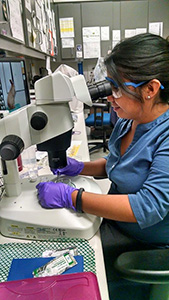Project Overview

Under the auspices of the Interagency Ecological Program (IEP), the California Department of Fish and Wildlife (CDFW) conducts special studies to develop information that is not readily available from existing long-term monitoring projects. Special studies are developed to address management questions that can arise from existing field sampling, laboratory studies, when implementing new sampling methodologies, or to inform analytical and modeling efforts. For example, a special study may be initiated when limited information exists on a life history trait of a fish species that could influence management decisions, or to understand catch efficiency among fish sampling gears to inform modeling abundance estimates. Special studies are often limited in duration, as short-term projects with narrow foci, but can include large-scale, multi-year projects.
Monitoring Design Review
In 2021, CDFW began a detailed technical evaluation “Monitoring Design Review and Improvements” of long-term biological monitoring surveys of pelagic fishes in the upper San Francisco Estuary conducted by CDFW under cooperative agreements with the U.S. Bureau of Reclamation (USBR) and the California Department of Water Resources (DWR). The CDFW Bay-Delta Stockton office has been conducting a series of biological fish monitoring surveys in collaboration with USBR and DWR since 1970 to meet permit obligations to the State Water Board and U.S. Fish and Wildlife Service (USFWS), National Marine Fisheries Service (NMFS) biological opinions for Delta Smelt and salmonids, and for incidental take permits issued by CDFW for operation of the State Water Project (SWP) and Central Valley Project (CVP). The interagency review effort was commenced to identify opportunities to improve the design of surveys conducted by CDFW to address current management needs. The evaluation is guided by an interagency (“6-Agency”) Steering Committee and conducted by the “Monitoring Design Team” (Design Team) including representatives from CDFW, USBR, DWR, USFWS, NMFS, and California State Water Resources Control Board (SWRCB) with technical support from Applied Marine Sciences and ICF International. The evaluation is part of an ongoing effort to improve monitoring activities in the estuary. Early evaluation findings by the Design Team and direction by the Steering Committee led to CDFW actions focusing on 1) assessment of monitoring access to areas and volumes of open water habitat throughout the estuary, 2) implementation of design-based abundance indices with uncertainty, and 3) improvement of spatial balance among studies. Monitoring Design Review efforts are ongoing.
Diet and Condition Study
The Quantitative Analysis of Stomach Contents and Body Weight for Pelagic Fishes (“Diet and Condition Study”) laboratory provides information on the foraging habits of young pelagic fishes in the San Francisco Estuary (SFE). This project was created to address questions of food limitation in young fish by understanding the types and amount of prey eaten among seasons and regions of the SFE. Food limitation can be an important factor to the annual recruitment success of young fishes using the estuary as a nursery, such as the listed Delta Smelt (Hypomesus transpacificus) and Longfin Smelt (Spirinchus thaleichthys) with comparison to their competitors (e.g. Wakasagi). Stomach contents (i.e. zooplankton) are identified to describe young fish diets and stomach fullness. Zooplankton found in stomachs is compared to the zooplankton samples collected from the environment by ongoing fish monitoring surveys that collected the fish. Condition of fish as weight at length is also examined to inform foraging success of fish to look for effects of diet, food availability, and environmental conditions such as conductivity, temperature, and water clarity. We utilize fish caught by CDFW, USFWS, and other IEP monitoring surveys throughout the SFE. Data from this laboratory includes multiple studies overtime to support modeling of annual recruitment success, life cycle models, and population trends in the SFE to inform management actions (e.g. summer-fall habitat flow actions, Suisun Marsh Salinity Control Gates modified operation, Delta Smelt Supplementation, Longfin Smelt habitat). Study staff facilitate CDFW IEP smelt sample logging and archiving and also facilitate transfer of Delta Smelt, Longfin Smelt, and other fishes, and their parts (i.e. fin clips for genetics) with collaborating researchers among IEP agencies and University of California, Davis.
Gear Efficiency Studies
The Gear Efficiency in Support of Delta Smelt Modeling Efforts (“Gear Efficiency Studies”) were conducted 2012–2016 to quantify the relative ability of various trawl nets to catch and retain Delta Smelt (Hypomesus transpacificus) to inform the Delta Smelt Life Cycle Modeling of abundance. This work used Delta Smelt length and catch data collected concurrently by trawl gears used by multiple IEP surveys to estimate relative gear selectivity, which in turn can be applied to calculation of absolute delta smelt abundance over time-area cells, and model the population dynamics using survey data in an integrated manner. In addition, this study investigated deployment of gear (e.g., 1 boat vs. 2 boat sampling) and the behavioral response of fish that could result in net avoidance or herding effects. The results of these efforts inform modeling efforts to estimate abundance and mortality rates for fish of management concern in the San Francisco Estuary.